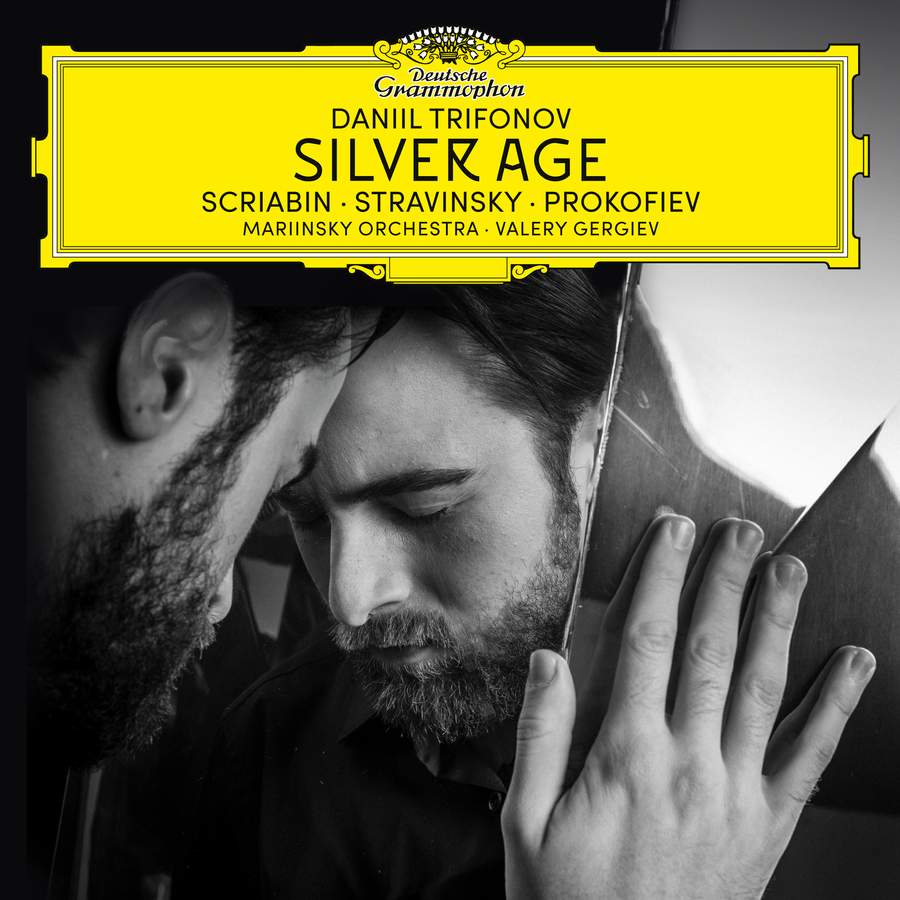PROKOFIEV; STRAVINSKY 'Silver Age' (Daniil Trifonov)
View record and artist detailsRecord and Artist Details
Composer or Director: Daniil Trifonov
Genre:
Orchestral
Label: Deutsche Grammophon
Magazine Review Date: 12/2020
Media Format: CD or Download
Media Runtime: 145
Mastering:
DDD
Catalogue Number: 483 5331

Tracks:
| Composition | Artist Credit |
|---|---|
| (3) Pieces from Cinderella |
Sergey Prokofiev, Composer
Daniil Trifonov, Composer |
| Cinderella, Movement: Gavotte |
Sergey Prokofiev, Composer
Daniil Trifonov, Composer |
| Concerto for Piano and Orchestra No. 2 |
Sergey Prokofiev, Composer
Daniil Trifonov, Composer Mariinsky Orchestra Valery Gergiev, Conductor |
| Sonata for Piano No. 8 |
Sergey Prokofiev, Composer
Daniil Trifonov, Composer |
| (5) Sarcasms |
Sergey Prokofiev, Composer
Daniil Trifonov, Composer |
| Concerto for Piano and Orchestra |
Alexander Scriabin, Composer
Daniil Trifonov, Composer Mariinsky Orchestra Valery Gergiev, Conductor |
| (The) Firebird |
Igor Stravinsky, Composer
Daniil Trifonov, Composer |
| Serenade |
Igor Stravinsky, Composer
Daniil Trifonov, Composer |
| 3 Movements from Petrushka |
Igor Stravinsky, Composer
Daniil Trifonov, Composer |
Author: David Fanning
Daniil Trifonov rightly describes Russia’s Silver Age as ‘an increasingly fractured social, political and intellectual environment – a cocktail of different artistic expressions, in agitated interaction’. Even so, it’s a bit of a stretch to press Stravinsky’s 1925 Serenade into an era generally defined as having been broken off by the 1917 Revolution. And that stretch goes to breaking point with Prokofiev’s Eighth Sonata, composed in the 1940s. I suppose ‘Five Russian blockbusters and some interludes’, though more accurate, wouldn’t have the same ring to it.
Titles aside, these are two exceptional discs in many ways. The Scriabin Concerto seems to me particularly successful, because Trifonov has a fine instinct for its ebb and flow of moods and for just how much dreamy dalliance he can afford without tipping over into self-indulgence. Prokofiev’s monstrously demanding Second Concerto sees him completely in his element so far as hyper-virtuosity is concerned: I doubt whether the bustling, motoric second movement or the helter-skelter outer sections of the finale have been more daringly or excitingly driven, and if parts of the first and third movements feel reined in to the point of being laboured, there are (arguably) legitimate character-driven reasons for this approach.
With the Eighth Sonata I have more concerns. In general Trifonov has difficulty keeping his inner agitation in check. When the central phase of the first movement demands ruthless control of tempo he cannot resist pressing forwards, and while his finale is superbly virtuoso it risks confusing means with ends – the virtuosity should surely be in the service of a vision of the work as a wartime epic, as it is with Richter (who is admittedly hors concours). Even the Petrushka movements and Agosti’s Firebird transcription – consummately athletic though the playing undoubtedly is – occasionally see the music pressed into the service of Trifonov’s virtuosity, rather than the more truly virtuous vice versa. The cure for this would be to learn from orchestral performances not only as stimuli towards original pianistic colourings but also as models for continuity and dramatic pacing (see Pollini’s Petrushka for a shining example).
Trifonov’s nervous temperament comes more completely into its own in Prokofiev’s Sarcasms, which can not only stand but positively invite his highly capricious treatment. In Stravinsky’s Serenade, where Trifonov is roughly at the polar opposite to the composer’s own poker-faced recording, it could be argued that his bigger-boned first movement, his unscheduled precipitato at the end of the Rondoletto and his agitato rather than the marked teneramente in the finale Cadenza are not entirely at odds with the music.
Something of a mixed bag, then, with a big ‘wow!’ factor balanced by some moments of ‘whoa!’.
Discover the world's largest classical music catalogue with Presto Music.

Gramophone Digital Club
- Digital Edition
- Digital Archive
- Reviews Database
- Full website access
From £8.75 / month
Subscribe
Gramophone Full Club
- Print Edition
- Digital Edition
- Digital Archive
- Reviews Database
- Full website access
From £11.00 / month
Subscribe
If you are a library, university or other organisation that would be interested in an institutional subscription to Gramophone please click here for further information.




